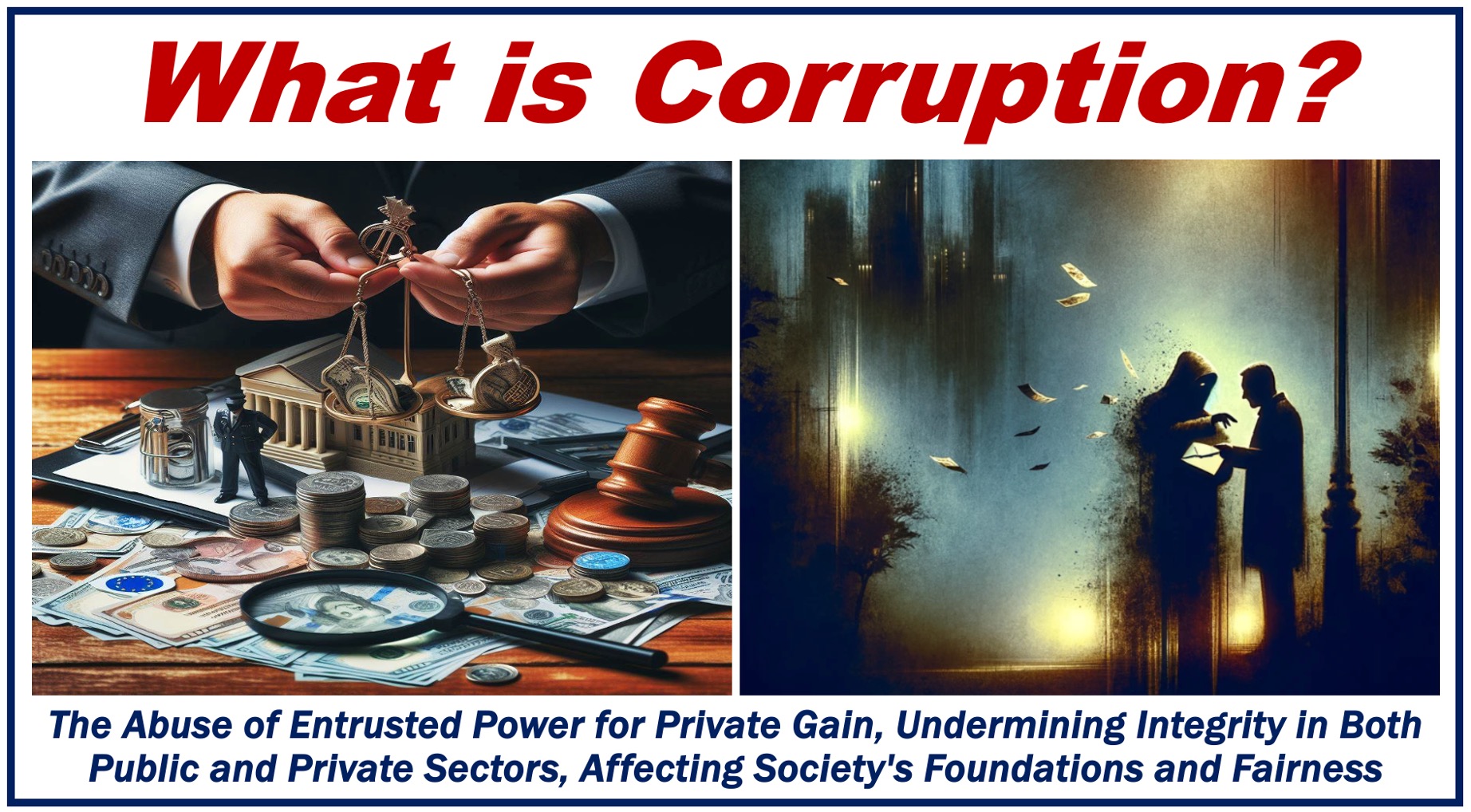Listen to This Article
Corruption involves the misuse of power and money for personal gain by private individuals, businesspeople, or government officials. It is a complex social, political, and economic phenomenon that exists worldwide to varying degrees.
Corruption can manifest in different forms, including fraud, bribery, extortion, embezzlement, and nepotism.
At its core, corruption is about breaking trust and skewing processes for personal or group benefit at the expense of another person/people or the public good.
The Cambridge Dictionary has the following definition of corruption:
“Dishonest or illegal behavior involving a person in a position of power, for example, accepting money for doing something illegal or immoral.”
Bribery is a form of corruption
In our article, “What is Bribery,” we wrote:
“If you attempt to make a person do something for you by giving them money, you are committing Bribery. Sometimes, the person who is bribing may give them a present or something they want, instead of money.”
Bribery can influence the decisions of government officials, leading to unfair advantages. It also undermines the integrity of public institutions.
Bribery can negatively affect public safety. For example, if a company paid a bribe to win a government contract to build a bridge, they may have to use inferior materials in the construction because some of the money for the project had to be used to pay the bribe. There is a greater risk of the bridge collapsing and human injuries or even deaths.
Embezzlement
Anybody in a position of trust who abuses that trust to commit fraud, that is, to steal money, is guilty of embezzlement, which is also a type of corruption.
There is small- and large-scale embezzlement. A shop assistant who steals money from the cash register is an embezzler, as is a top executive in a multinational who transfers company funds illegally into their account.
When government officials and people in power embezzle money, they can significantly harm public resources and the overall economic health of a nation.
Embezzlement drains resources from public services, leading to inferior healthcare, education, and infrastructure.

Nepotism and cronyism are forms of corruption
Nepotism involves giving family members top jobs and other opportunities. If I am president and I appoint my sister as CEO of the state-run oil company, I am guilty of nepotism. CEO stands for chief executive officer.
Cronyism involves giving jobs and other advantages to friends or trusted colleagues, especially in politics and between politicians and supportive organizations.
Cronyism and nepotism in government are bad for society because the best people for certain positions are bypassed.
Other types of corruption
Below, you can see words that describe eight different types of corruption, their meanings, and an example of how they can be used in a sentence:
-
Fraud
Deceiving others for personal gain.
Example: “The accountant committed fraud by falsifying the company’s financial statements.”
-
Extortion
Forcing someone to give up property (usually by paying money) by threatening harm.
Example: “The official was arrested for extortion after demanding money in exchange for political favors.”
-
Money Laundering
Concealing the origins of illegally obtained money.
Example: “They were accused of money laundering through their international businesses.”
-
Kickbacks
Payments made to someone who has facilitated a transaction. In other words, the money that is used in a bribe.
Example: “He received kickbacks for referring clients to the fraudulent investment scheme.”
-
Influence Peddling
Using one’s position or connections to gain favors.
Example: “The politician’s influence peddling was exposed in a high-profile case.”
-
Vote Buying
Offering something of value in exchange for a vote.
Example: “Vote buying was rampant, with citizens being offered cash for their electoral support.”
-
Graft
Using political power for personal gain.
Example: “The mayor’s graft included awarding city contracts to his own businesses.”
- Patronage
Favoring supporters by giving them jobs or benefits.
Example: “The new administration was criticized for its patronage of party loyalists in key positions.”
Conclusion
Corruption can occur in the private or public sector and may involve individuals, groups, or whole organizations. It may involve a traffic policeman who asks for a bribe from somebody who jumped the red traffic lights to the president of a country who robbed millions from the public purse.
It is our duty as citizens to do what we can to prevent corruption, for our own and the public good.
Other contexts
The term “corruption” can be used in other contexts with slightly different meanings. Let’s have a look at some of them:
- Computing: Data corruption means errors that make data unreadable or unusable.
- Language: Linguistic corruption is when words change in spelling, pronunciation, or meaning over time.
- Biology: Genetic corruption refers to DNA mutations causing disorders or trait changes.
- File Systems: File corruption is damage making computer files unopenable or incorrect.
- Politics: Political corruption involves the decay of political ethics, leading to unethical practices.
- Cultural: Cultural corruption is the loss of cultural values or practices due to external influences.
- Moral and Ethical: It describes the decline of moral integrity or ethical values.
- Physical Materials: Refers to the decay or deterioration of materials like metal corrosion or food spoilage.
